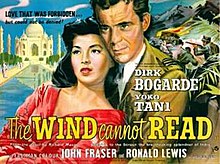fiction.wikisort.org - Movie
The Wind Cannot Read is a 1958 British drama film directed by Ralph Thomas and starring Dirk Bogarde, Yoko Tani, Ronald Lewis and John Fraser.[1] It was based on the 1946 novel by Richard Mason, who also wrote the screenplay.
| The Wind Cannot Read | |
|---|---|
 Original British quad poster | |
| Directed by | Ralph Thomas |
| Written by | Richard Mason (novel and screenplay) |
| Produced by | Betty E. Box Earl St. John |
| Starring | Dirk Bogarde Yoko Tani Ronald Lewis John Fraser |
| Cinematography | Ernest Steward |
| Edited by | Frederick Wilson |
| Music by | Angelo Francesco Lavagnino |
Release date | 1958 |
Running time | 115 minutes |
| Country | United Kingdom |
| Language | English |
Songwriter Peter Hart received the 1958 Ivor Novello award for Best Song Musically and Lyrically for the title song, performed by Vera Lynn.[2]
The title derives from a Japanese poem, and lines from the poem are prominently displayed (in English) in the movie. The same lines are on the tombstone of novelist/screenwriter Mason, who died in 1997.
Plot
The film takes place in Burma and India during World War II.
A British officer falls in love with his Japanese instructor at a military language school. They start a romance, but she is regarded as the enemy and is not accepted by his countrymen. They marry in secret and plan on spending his two weeks' leave together. When one of the other officers is injured, he is sent into the field as an interrogator. Later he is captured by the Japanese army when he is patrolling with a brigadier and an Indian driver in a Japanese-controlled zone. He escapes and returns to his own lines, only to discover that his wife is suffering from a brain tumour. Although the doctor initially gives her good odds of surviving, she dies after an operation.
Cast
- Dirk Bogarde as Flight Lieutenant Michael Quinn
- Yoko Tani as Aiko Suzuki ('Sabbi')
- Ronald Lewis as Fenwick
- John Fraser as Peter Munroe
- Anthony Bushell as Brigadier
- Heihachirō Ōkawa as Lieutenant Nakamura (Japanese: 陸軍中尉中村, Rikugun-Chūi Nakamura)
- Marne Maitland as Bahadur
- Michael Medwin as Officer Lamb
- Richard Leech as Hobson
- Tony Wager as Moss
- Tadashi Ikeda as Itsumi-san
- Yôichi Matsue as Corporal Mori (Japanese: 毛利伍長, Mōri Gochō)
- Donald Pleasence as Doctor
- Joy Michael as First nurse
- Avice Landone as Second nurse
- Jasdev Singh Soin as Indian soldier
Production
In 1955 David Lean agreed to film Richard Mason's novel The Wind Cannot Read, the story of a romance between a British officer and a self-exiled Japanese woman in India circa 1943, during World War II.[3]
Originally Lean considered making the lead character a Canadian and offered the part to Glenn Ford.[4] Lean also offered the role to Kenneth More, who was unsure about whether the public would accept him in the part and turned it down. It was a decision More later regarded as "the greatest mistake I ever made professionally".[5] Lean had completed a script in collaboration with Mason and cast Keiko Kishi as the girl, but disagreed with Alexander Korda, who was to have produced the film and the project fell through.[6]
Lean had already entered into discussions with Sam Spiegel, regarding a film version of Pierre Boulle's novel The Bridge on the River Kwai. After Korda's death in 1956, the rights to Mason's novel were sold to Rank Film Productions, who assigned the project to the team of Betty Box and Ralph Thomas.[7]
Filming took place on location in India in early 1958, with Dirk Bogarde in the main role.[8][9]
Ralph Thomas later said he thought Sir John Davis of Rank "very bravely" authorised location-filming in India "because he trusted David Lean's judgement that it was a splendid book. It was a real three-handkerchief picture, which I thoroughly enjoyed making, and Dirk was very good in it."[10]
Reception
The film was one of the most popular at the British box office in 1958.[11][12] Kinematograph Weekly listed it as being "in the money" at the British box office in 1958.[13]
References
- BFI.org
- Lister, David (28 May 1994). "Pop ballads bite back in lyrical fashion". The Independent.
- STEPHEN WATTS (19 June 1955). "SCANNING THE CURRENT BRITISH SCREEN SCENE: DIRECTOR DAVID LEAN MOVES EASTWARD -- WAR EPIC --COLUMBIA'S AGENDA". New York Times. p. X7.
- Schallert, Edwin (22 October 1956). "Monroe Specifications Named for 'Karamazov,; Lean Offers Ford Film". Los Angeles Times. p. A11.
- Kenneth More, More or Less, Hodder & Staughton, 1978 p 228
- "BFI". Archived from the original on 3 August 2013. Retrieved 3 August 2013.
- STEPHEN WATTS. (3 March 1957). "ON BRITAIN'S VARIED MOVIE FRONTS: AMERICAN STAR PROBLEM --CHAPLIN'S ROCK 'N' ROLL--CRITICISM POSER UP-TO-DATE "KING" GALLIC CRITIQUE HEADED FOR INDIA OUT OF THE PAST". New York Times. p. 113.
- "JAPANESE FILM STARS FOR INDIA: SHOOTING OF PICTURE". The Times of India. 18 January 1958. p. 11.
- British Cinema of the 1950s: The Decline of Deference by Sue Harper, Vincent Porter. Oxford University Press, 2003 p 53
- Brian McFarlane, An Autobiography of British Cinema 1997 p 558
- "Britain's Money Pacers 1958". Variety. 15 April 1959. p. 60.
- Thumim, Janet. "The popular cash and culture in the postwar British cinema industry". Screen. Vol. 32, no. 3. p. 259.
- Billings, Josh (18 December 1958). "Others in the Money". Kinematograph Weekly. p. 7.
External links
- The Wind Cannot Read at IMDb
Другой контент может иметь иную лицензию. Перед использованием материалов сайта WikiSort.org внимательно изучите правила лицензирования конкретных элементов наполнения сайта.
WikiSort.org - проект по пересортировке и дополнению контента Википедии